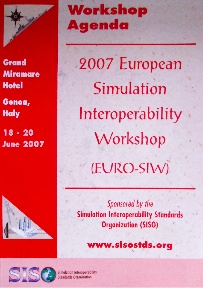Semantically Rich Interfaces for Simulation Interoperability
Abstract
The size and scope of simulation models is constantly growing in order to keep up with the requirements imposed by increasingly complex scenario analyses. Moreover, advances in the performance of simulation hardware, of communication software, and development frameworks, also offer unprecedented opportunities. As a consequence, the complexity of the design, implementation and deployment of simulation models is also increasing, up to a point that it might soon become unmanageable. We describe an approach aimed at taming such complexity based on the use of ontologies to structure modelling and simulation knowledge, which can be manipulated through a knowledge manager to facilitate the development of models and tools for simulation. We present two case studies and demonstrations of this approach. The first targets the integrated assessment of the common agricultural policies of the EU where models pertaining different domains (environmental, social, economic) and different scales (local, regional, continental) must be integrated. The second focuses on the integrated design of energy supply systems, where alternative models for energy supply systems must be integrated in order to select the best combination to produce energy minimizing costs and environmental impacts.
Download full text in pdf format
 Published as:
Published as:
A. E. Rizzoli,
H. Li,
I. N. Athanasiadis,
F. Marechal,
Semantically Rich Interfaces for Simulation Interoperability,
European Simulation Interoperability Workshop (EuroSIW 2007), pg. 60,
2007, Simulation Interoperability Standards Organization.
You might also enjoy (View all publications)
- CY-Bench: A comprehensive benchmark dataset for sub-national crop yield forecasting
- Hybrid phenology modeling for predicting temperature effects on tree dormancy
- To measure or not: A cost-sensitive, selective measuring environment for agricultural management decisions with reinforcement learning
